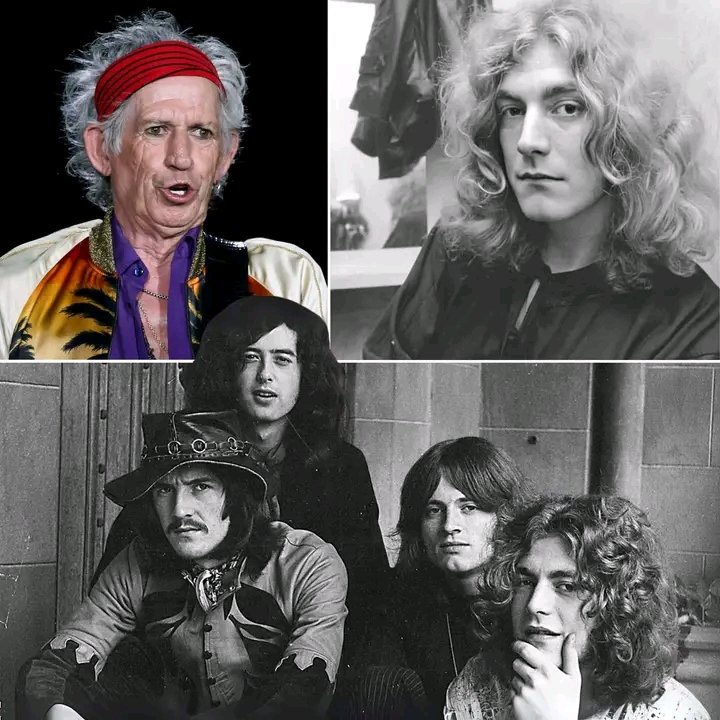“Too Acrobatic for My Taste”: Inside the Unspoken Rift Between Keith Richards and Robert Plant — When Two Titans of British Rock Clash in Sound and Spirit
In the pantheon of British rock legends, few names carry the weight of Keith Richards and Robert Plant. Both rose to prominence in the seismic 1960s music explosion, rewriting the rules of rock ‘n’ roll and defining the aesthetic, attitude, and artistry of their generation. Yet, for all their shared history, mutual influence, and occasional intersections, there’s never been much warmth between the Rolling Stones guitarist and the Led Zeppelin frontman. In fact, what lies beneath the surface is a tension shaped by style, personality, and a fundamental difference in philosophy about what rock music should be.
Keith Richards, with his weathered riffs and blues-drenched instincts, has always embodied a kind of primal authenticity. His playing is ragged but true—steeped in Chicago blues, reggae, and rockabilly. For him, rock music is about feel, not flash. So when he speaks of Robert Plant, he doesn’t mince words. “Too acrobatic,” Richards once quipped when asked about Plant’s legendary vocal gymnastics. “It started to get on my nerves.” In Richards’ world, less is more. Emotion trumps exhibitionism. And to his ears, Plant’s high-flying vocals sounded more like theater than soul.
That jab may seem minor, but in the world of rock royalty, such comments echo. After all, Robert Plant isn’t just any singer. He’s the voice of Led Zeppelin—a band that redefined stadium rock with mythic lyrics, thunderous arrangements, and vocals that tore through the stratosphere. Where Richards dug into groove, Plant soared into the ether. Their musical DNA couldn’t be more different. And that difference, over time, seemed to calcify into something closer to disdain.
The one moment their paths crossed in the studio—during the 1974 recording of “Scarlet,” a loose, jammy track featuring Jimmy Page and Richards himself—might have served as a bridge between their worlds. Instead, it only highlighted the gulf. While the song eventually surfaced in 2020 to much fanfare, its origin story paints a different picture. The session was reportedly tense, with egos jostling for room and chemistry running low. There was no animosity, perhaps, but also no spark—just two giants circling, never truly colliding.
Richards has never been one to chase myths or adorn rock with grandeur. Plant, on the other hand, thrived in the mythical—singing of Viking raids, mystic mountains, and celestial women. It wasn’t just a difference in taste. It was an aesthetic divide. Richards saw rock as rebellion from the earth up; Plant conjured it from the heavens down. In interviews, Richards has always kept his assessments sharp and unsentimental. His criticisms of Zeppelin’s bombast are not new, but his singling out of Plant shows a more personal edge—one that implies not just artistic disagreement, but a deeper lack of respect.
To his credit, Robert Plant has rarely responded in kind. If he felt stung by Richards’ comments, he hasn’t shown it. Instead, he’s continued to evolve as an artist—dabbling in folk, Americana, and world music, moving far from the golden god image of his Zeppelin days. That adaptability, in its own way, is a quiet rebuttal to the criticism. Plant’s voice may once have been “too acrobatic” for Richards, but it has never stopped exploring new terrain.
Ultimately, the Richards-Plant disconnect speaks to something larger: the diversity within rock’s golden generation. It wasn’t a monolith. Its heroes didn’t always get along. And its legends often disagreed about what it meant to be true to the form. For fans, that friction isn’t a flaw—it’s part of the fascination. Two men, born of the same storm, walking different roads: one with a snarl and a Telecaster, the other with a wail and a dream.
